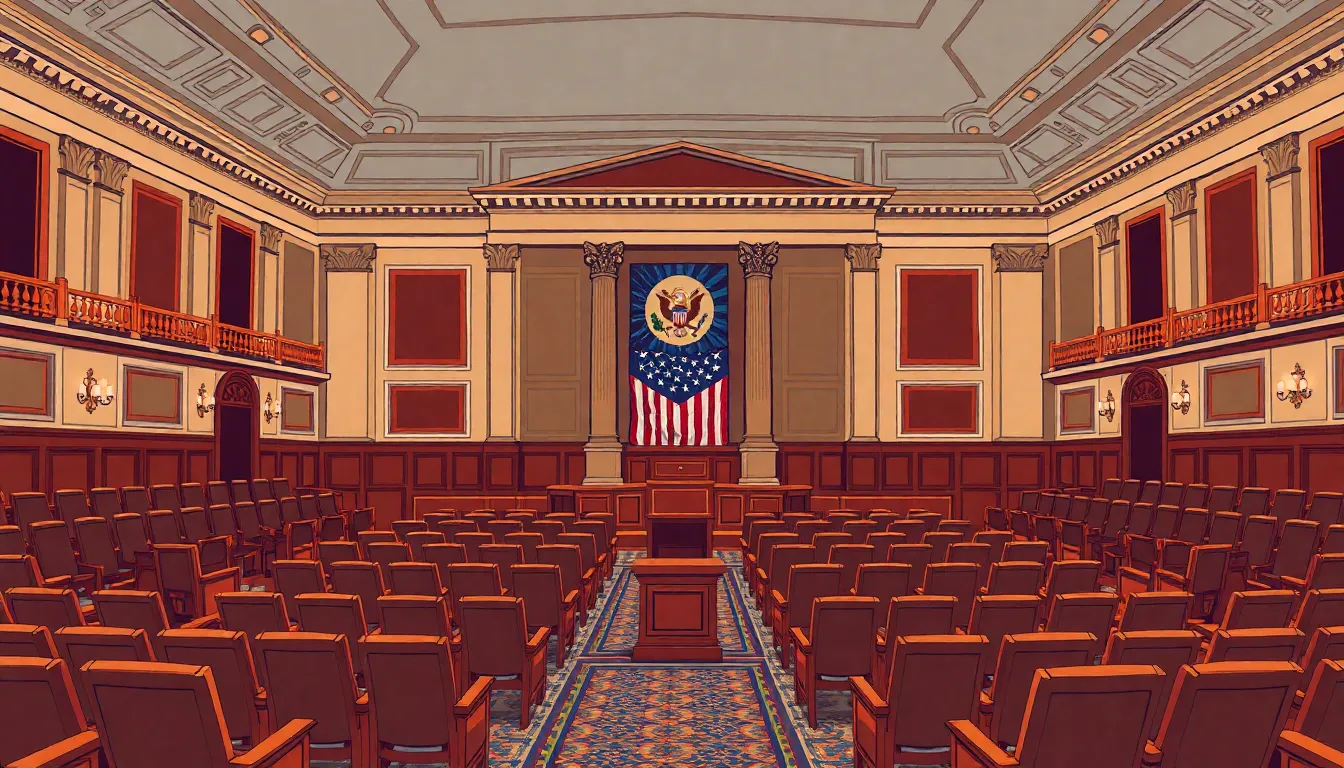When a congressman faces censure, it’s like getting a stern talking-to from the principal—except this principal has the power to make laws and occasionally wear a powdered wig. Censure is a formal reprimand that can send shockwaves through the halls of Congress, leaving lawmakers wondering if they should start practicing their apology speeches.
But what does this really mean for the congressman involved? It’s not just a slap on the wrist; it’s a public shaming that can tarnish reputations and alter political careers. In the world of politics, where every move is scrutinized, censure can be a wake-up call or a devastating blow. Buckle up as we dive into the nitty-gritty of what happens when a congressman gets called out for their antics.
Table of Contents
ToggleOverview of Censure in Congress
Censure in Congress represents a formal reprimand that can significantly affect the congressman involved. This action results in public shaming, often damaging reputations and altering political careers.
Definition of Censure
Censure acts as an official expression of disapproval by Congress. It usually arises as a response to misconduct or unethical behavior. While not as severe as expulsion, censure carries serious consequences. It can lead to loss of committee assignments and diminished influence among peers. Public perceptions often shift negatively, resulting in reduced support from constituents as well. Congress uses this measure to maintain its integrity, ensuring accountability among its members.
Historical Context
Censure has a long history in Congress, dating back to the early years of the Republic. The first recorded censure occurred in 1799 against Representative Matthew Lyon. Over time, numerous congressmen have faced censure for various offenses. High-profile cases include those involving corruption, ethical violations, and behavior unbecoming of an elected official. Such historical instances illustrate the seriousness of censure and its role as a tool for legislative oversight. The practice has evolved, but the core intent remains: to uphold ethical standards in Congress.
The Censure Process

Censure involves a series of formal steps that Congress follows to address a congressman’s misconduct. It begins with a resolution, typically introduced by a member of Congress.
Steps Involved in Censure
Initiating the censure process starts with drafting a resolution outlining the allegations. This resolution must be submitted and referred to the appropriate committee. A committee review happens next, allowing for discussions and revisions. Following this, the full chamber considers the resolution and debates its merits. Voting occurs, and a simple majority is required for approval. Depending on the outcome, the congressman may receive a formal reprimand, which gets recorded in the congressional record.
Role of the House and Senate
In the House of Representatives, censure resolutions are typically discussed in the Ethics Committee before reaching the floor. The Senate addresses censure similarly but may involve additional procedural requirements. Both chambers prioritize maintaining ethical behavior among members. Accountability lies at the forefront, ensuring that misconduct does not go unchecked. Each chamber fosters an environment that promotes trust and integrity within the legislative process.
Consequences of Censure
Censure leads to significant consequences for the congressman involved. These consequences affect reputation, influence, and career trajectory.
Immediate Impacts on the Congressman
An immediate repercussion of censure includes public embarrassment from the formal reprimand. His or her reputation may suffer as constituents and peers become aware of the misconduct. Short-term influence in legislative matters declines, as the congressman may lose committee assignments. Stress levels often increase due to the public scrutiny and backlash faced from both the political community and the media. In certain cases, financial contributions from supporters may diminish, affecting campaign funding.
Long-Term Effects on Career
Long-term career effects can be severe for a congressman who faces censure. It may lead to diminished trust among colleagues, impacting collaborative efforts. Future electoral campaigns might suffer due to declining public perceptions and support. The congressman’s political party may distance itself, complicating relationships within the party. Some representatives experience a permanent shift in their political landscape, making it challenging to regain prior standing or influence. Rebuilding a tarnished reputation demands considerable effort and time, often requiring a clear demonstration of ethical conduct moving forward.
Case Studies of Censured Congressmen
Censure has impacted many congressmen throughout history. Notable cases illustrate the variety of offenses leading to formal reprimands.
Notable Instances of Censure
Representative Charlie Rangel faced censure in 2010 for ethical violations, including tax evasion. His censure marked a significant moment, as he became only the 23rd member in history to receive this punishment. In 2021, Representative Paul Gosar received censure for sharing an animated video depicting violence against a political opponent. His actions prompted a swift Congressional response and catalyzed discussions about social media conduct among members.
Analysis of Outcomes
Consequences of censure vary significantly among affected congressmen. Representative Rangel struggled to regain public trust after his reprimand, leading to his eventual retirement from politics. In contrast, Representative Gosar remained popular among his constituents, indicating that political context plays a crucial role in the aftermath of censure. Each instance highlights how public perception and support can shift dramatically, shaping future political trajectories.
Public and Political Reactions
Responses to a congressman’s censure vary widely, often showing diverse perspectives from media outlets and constituents.
Media Coverage
Media coverage typically amplifies the repercussions of censure. News organizations may focus on the details of the misconduct, resulting in widespread attention. Investigative pieces often explore the implications for the congressman’s career. Headlines can sensationalize events, further shaping public perception. Editorials may provide opinions on ethical standards and accountability in Congress. Coverage also highlights the reactions of fellow lawmakers and party leaders, influencing broader political discourse. The portrayal in the media can ultimately impact voter sentiment and future electoral outcomes as the story unfolds.
Constituents’ Responses
Constituents often react strongly to a congressman’s censure. Public opinion polls may shift, reflecting changes in voter confidence and approval ratings. Some constituents express outrage, demanding accountability and higher ethical standards. Others might support their representatives, viewing censure as politically motivated. Letters and social media comments provide immediate insight into constituents’ feelings, revealing a mix of disappointment and loyalty. Political rallies and town hall meetings can serve as platforms for constituents to voice their opinions directly. The overall response significantly affects the congressman’s ability to maintain support and navigate future electoral challenges.
Censure serves as a powerful mechanism within Congress to uphold ethical standards and accountability among its members. The repercussions for a congressman facing censure can be profound, affecting their reputation and political future. While some may recover and regain support, others may find it challenging to overcome the public scrutiny and loss of influence.
The varying reactions from constituents and the media further complicate the landscape, making it crucial for censured congressmen to navigate the aftermath carefully. Ultimately, censure is more than just a reprimand; it’s a pivotal moment that can redefine a political career and shape the dynamics within Congress.



